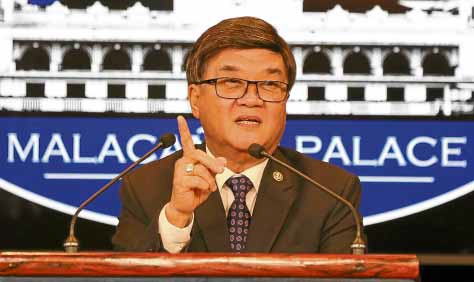In accordance with the Securities and Exchange Commission’s decision revoking Rappler’s corporate registration, Justice Secretary Vitaliano Aguirre II on Tuesday said his office had started looking into the criminal liability of the news website.
“I have directed my legal staff to study the legal issues of this case,” Aguirre told reporters.
Asked if the investigation would include the criminal aspect of the case, Aguirre replied, “Yes, it will cover all angles.”
Notwithstanding the actions of the Securities and Exchange Commission (SEC) and the Department of Justice (DOJ), Malacañang insisted that President Rodrigo Duterte had nothing to do with the order revoking the license to operate of Rappler.
Had Mr. Duterte wanted to shut down a media organization , he would have sent the military to padlock Rappler’s office, said presidential spokesperson Harry Roque.
Roque said the President called him for the first time on Monday to deny involvement in the SEC ruling on Rappler. “He was not even aware there was this decision coming up,” he said.
The President himself disputed Rappler’s claim that the SEC order to shut down its operations constituted an attack on press freedom, according to Roque.
The SEC referred its Jan. 11 decision to the DOJ for “appropriate action” on Rappler’s possible violation of the antidummy law, a criminal offense.
SolGen statement
For his part, Solicitor General Jose Calida denied Malacañang had ordered him to pursue the case against Rappler.
“Definitely not. Nobody asked me. I was just doing my job. You know me. I do things on my own. I don’t take orders,” Calida said.
According to him, he read reports and commentaries questioning the supposed foreign ownership in Rappler.
Calida said he left it to the SEC to determine whether Rappler complied with constitutional and statutory requirements.
“The SEC has already ruled and we respect it. They are the experts on this,” he said, adding he agreed with the commission that the constitutional provision on 100-percent Filipino ownership and control of local media must be upheld.
Charter provisions
Calida said Rappler and its executives may be held liable for violation of the antidummy law, the law on corporations, or the constitutional provision on media ownership.
“If you engaged in a business of mass media you have to comply with the constitutional and statutory requirements of the law, because no one is above the law, not even powerful media,” he added.
Article 16, Section 11 (1) of the 1987 Constitution provides that the operation of mass media in the country “shall be limited to citizens of the Philippines, or to corporations, cooperatives or associations, wholly owned and managed by such citizens.”
The SEC, in its ruling, said Rappler engaged in a “deceptive scheme to circumvent the Constitution” when it granted Philippine depositary receipts (PDRs) to a foreign investor, the Omidyar Network of eBay founder Pierre Omidyar.
PDRs are instruments that give foreign investors a passive economic interest in a Philippine company.
The SEC said the PDRs issued to Omidyar Network allowed it to exercise veto rights over Rappler’s corporate activities. —Reports from Jerome Aning and Leila B. Salaverria
